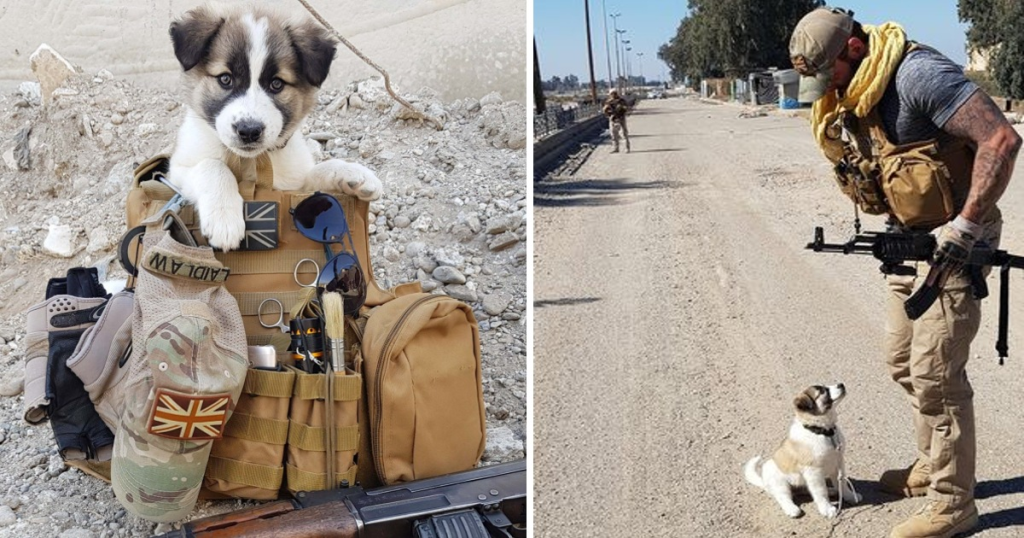
The story of Sean Laidlaw, a former soldier with the Royal Engineers who found a Chihuahua puppy in the rubble of a school devastated during fighting in the war-torn Syrian city of Raqqa, is a tale of hope and redemption.

In February 2018, only four months after the U.S.-led coalition had liberated Raqqa from ISIS, Sean and his team were tasked with clearing the thousands of IEDs (Improvised Explosive Devices) that had been hidden in buildings and crevices. As they were checking their surroundings for tripwires and motion detectors, they heard the sound of an infantile wailing coming from behind a big concrete pedestal. They knew better than to rush to the rescue, as having a child scream was a frequent ISIS technique to lead them into a booby trap. It took them a bit to work out that it was coming from a small and very frightened Chihuahua surrounded by the bodies of three other pups and one enormous dog, likely his mother.

Sean, who had been a soldier for most of his adult life and had seen the horrible repercussions of war, felt a connection with the trembling puppy. He was born in the bowels of the beast, and Sean knew what it was like to be afraid. Putting on extra-thick battle gloves, he passed him a biscuit with his medical clamps. After some thought, the puppy took a tiny nibble, and Sean patted him lightly, his hands still shielded by Army-grade gloves. The crew laughed when Sean used baby speak to address the puppy, but he knew that this was no ordinary dog.

Sean had left the Army in 2014, following seven years which had included two rigorous tours in Afghanistan. He was suffering from Post Traumatic Stress Disorder (PTSD) but didn’t know it at the time. Back home in Essex, he tried to make a living as a personal trainer, but after his girlfriend had a miscarriage, he started drinking heavily and ended up sleeping in his van to stop his parents noticing the state he was in. When he was asked to take his friend’s position in the Syrian team, he needed little persuasion. He arrived in January 2018 and met Barry, the Chihuahua puppy, a month later.

The day after they first found Barry, Sean returned to the rubble of the school but felt sad when there was no sign of him. As they prepared to drive back to base, he told himself that everything was fine, that he barely knew him, and that he had other priorities. But he lit up when he heard one of the Syrians he worked with shouting: “Barry! Barry! Barry!” He’d buried himself somewhere to escape the cold night winds, and he must have wondered who this geezer was who wouldn’t leave him alone. Sean had to take a leap of faith if Barry was ever to take one on him.

Despite his better judgment, Sean stretched his hand – gloveless and bare – and lightly caressed his head. He liked touching him; it felt right. But it was only after another two days of such visits that Barry appeared sure enough of Sean that he could take him back to their headquarters. When Sean held him in his arms for the first time, he knew that Barry was his little boy, and he was his dad.

Barry snored loudly on the ride back to base, and Sean’s life changed forever. He found a reason to live again, and he knew that he had to take care of Barry. He took him on patrols and fed him MREs (Meals Ready to Eat). Barry became a mascot for the team, and he gave them all a reason to smile. Sean’s mental health improved, and he learned to cope with his PTSD. He even started thinking about his future, about how he could use his experiences to help other veterans who were struggling with similar issues.

After eight months in Syria, Sean had to return to the UK, but he couldn’t leave Barry behind. He went through a grueling process of paperwork, health checks, and vaccinations to bring him home, but it was all worth it. Barry became an instant celebrity, with media outlets clamoring to tell their story. They appeared on TV shows and in newspapers, and Sean used their newfound fame to raise awareness of PTSD and the importance of support for veterans.

But for Sean and Barry, their bond was more than just a publicity stunt. They were inseparable, and Sean knew that Barry had saved his life. He had given him a reason to get up in the morning, to face the day ahead. He had shown him that there was still good in the world, even in the midst of war and destruction.

Sadly, Barry passed away in 2020, but his legacy lives on. Sean has written a book about their experiences together, called “Willing to Die,” and he continues to advocate for mental health support for veterans. He has also set up a charity called “Veterans with Dogs” that trains and provides assistance dogs to veterans suffering from PTSD.

The story of Sean and Barry is a powerful reminder that even in the darkest of times, there is still hope. It shows that the love and companionship of an animal can be a lifeline for someone struggling with mental health issues. And it highlights the importance of supporting our veterans, who have given so much in service to their country.
PLEASE GIVE ONE LIKE ON FACEBOOK FOR THIS AMAZING STORY AND SHARE THE ARTICLE WITH YOUR FRIENDS!




Beautiful story. Prove that animals can and do fill a void in our hearts and life’s. They can and are our life line forever.